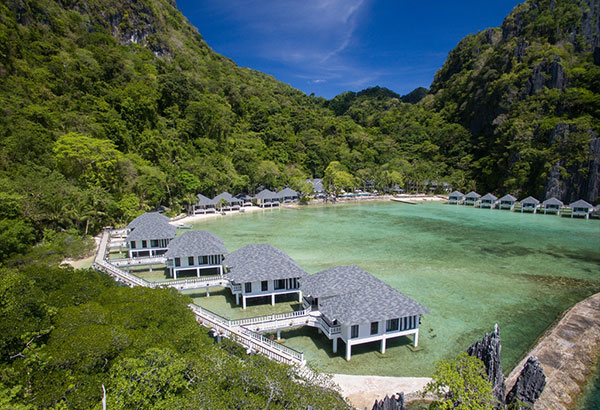Ayala Land’s leap: Fernando Zobel: Sustainable tourism is the key in El Nido


El Nido’s Lagen Island: “Nothing taller than a coconut tree. Respect for the land, respect for the environment.”
It takes a village to raise a child. Tweaking this saying, I ask: What does it take to raise a village?
A resort village so pure, fragile and beautiful it would seem God put it in the palm of His hand and protected it from any reckless and thoughtless planning and disregard for the environment, as often afflicts resorts with no long-term vision.
This resort village is El Nido in Palawan, and thanks to its stewards, it continues to reap awards for continuing to be one of the most beautiful beaches and island destinations in the world, the one that garners Asia’s Most Responsible Tourism Award. It remains the soothing paradise we still have, amid all the vexations that torment our collective soul and dampen our national spirit.
“The keyword to preserving this paradise is sustainable tourism,” says Fernando Zobel, chairman of Ayala Land, which nurtures this property with the firm grasp of a company that has produced other tourism winners.
“We must ensure that nature remains El Nido’s main attraction,” he says. “We want to make El Nido a model of sustainable tourism. We feel a great responsibility to preserve its natural beauty and conserve biodiversity around the islands.”
While Zobel’s company tends to this resort village, it also takes care of the people who are part of its natural assets.
“We cannot do it alone. We are working with the LGU and the local communities. Tourism is the best source of livelihood for these communities, but it is critical that proper planning and zoning be implemented — and that we protect the unique environment,” Zobel emphasizes.
Zobel led Ayala Land executives in hosting the 19th Ayala Malls Merchant Rewards for its top retailers last week — in El Nido.
Ayala Land has made sustainable tourism its mantra — call it ecotourism meets heritage conservation, if you will — as seen in its other projects in Bohol, Cebu and Sicogon.
“We’re not into this development just for the sake of selling,” asserts Junie Jalandoni, Ayala Land SVP and group head for commercial business, ALI capital, AL offices, hotels and resorts. “We hope that we’re able to develop this place not just for this generation, but for future generations. It is something that should make us all happy in the very long term.”
The must element here is foresight. And patience, which Ayala Land arms itself with, as it thinks not just of today. “Yes, our main focus is sustainable tourism,” adds Jalandoni, “as against just mass tourism. Or tourism for the sake of tourism.”
Ayala Land’s guideline in building resort hotels here? “Nothing taller than a coconut tree. Respect for the land, respect for the environment,” says Jalandoni.
“When you head for El Nido’s islands like Pangulasian, for instance, you don’t see concrete buildings jutting out of the trees. You only discover up-close that there are resort villas hidden by the greenery,” says Javi Hernandez, president of Ten Knots Development Corporation, the subsidiary of Ayala Land that develops El Nido, including Lio, which is its new tourism estate.
Ten Knots was the Filipino-Japanese joint venture in 1983 that opened a diver’s resort on El Nido’s Miniloc and, later, Pangulasian and Lagen islands. In 2008, Ayala Land came in with a 40-percent interest in the company, and by 2013, Ten Knots had become 100 percent an Ayala Land subsidiary.
What about concerns raised by terrorism?
“The problem of tourism in the Philippines is that it was always up against terrorism, and going up against poor infrastructure,” notes Jalandoni.
“Tourism will be a growth industry for the Philippines, regardless. Because you see terrorism anyway in other European countries. It’s an international issue, not a Philippine issue. On the infrastructure side, okay, let’s build our own airport and our own runway (Lio Airport) and invest in our own plane (Air Swift). So these were really critical elements in putting in the infrastructure.
“It was a leap of faith for us because back in 2008, nobody was looking at Philippine tourism. Now, we’re looking not just at Palawan but other areas as well, like Sicogon. Hopefully our 20th year Merchant Awards will be in Sicogon.”
Aside from its branded hotels like Raffles, Fairmont and Holiday Inn, Ayala Land has Seda, its own homegrown hospitality hotel.
Al Legaspi, COO of Ayala Land Hotels and Resorts, asserts that “there is a big market there that’s working for sustainable tourism. And our present resorts are hitting these markets. The bigger issue in this generation now is climate change. People are just so conscious about the environment.
“Millennials,” Legaspi adds, “are a big market. It is said that by 2025, more than 50 percent of our population will be millennials. We’ve been too fixated on foreign arrivals. Last year we had six million arrivals in the country, but we had 50 to 70 million from the domestic market. A big percentage of these are millennials.”
Jalandoni cites what Zalora shared that day in El Nido with Ayala Malls merchants: “About 70 percent of Filipinos is under 30 years old.”
Hence there will be rooms for millennials and backpackers in the Lio Tourism Estate where hotels like Casa Kalaw, Hotel Covo and Balai Adlao, Seda Lio and Lio B&Bs will complete a total of 1,000 rooms by the year 2022. The P11 billion investment for El Nido began in 2016.
There will be residential projects — including mid-residential condos to be launched by 2018.
For millennials, there will be hostel-type rooms at P2,000 per night. For those willing to spend up to $800 per night, there are the island resort hotels.
How is El Nido kept so clean? “Recycling and segregating wastes is an important focus here, the same way it was implemented in Ayala Malls by Rowena Tomeldan, head of Ayala Malls group,” notes Jalandoni. “In El Nido, we have an area for organic farming, where waste is converted into fertilizer.”
Jalandoni adds: “It’s not just about the environment, it’s also about the community. Some 80 percent of our suppliers are sourced locally. Some 85 percent of Ayala Land’s workforce in El Nido are local hires from a 45,000 population serving 180,000 tourists. Township components at the Lio Tourism Estate include employee housing, market, schools, medical facilities and church.”
So there. It takes a caring company to raise a village.















